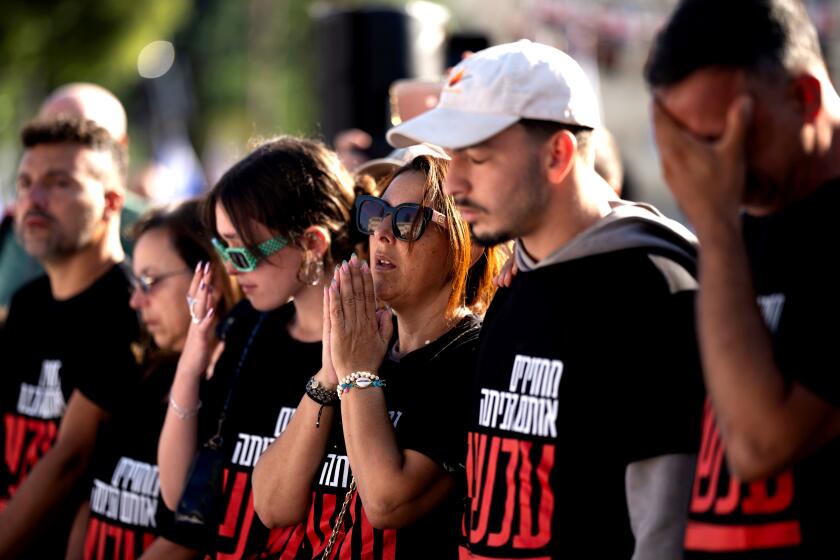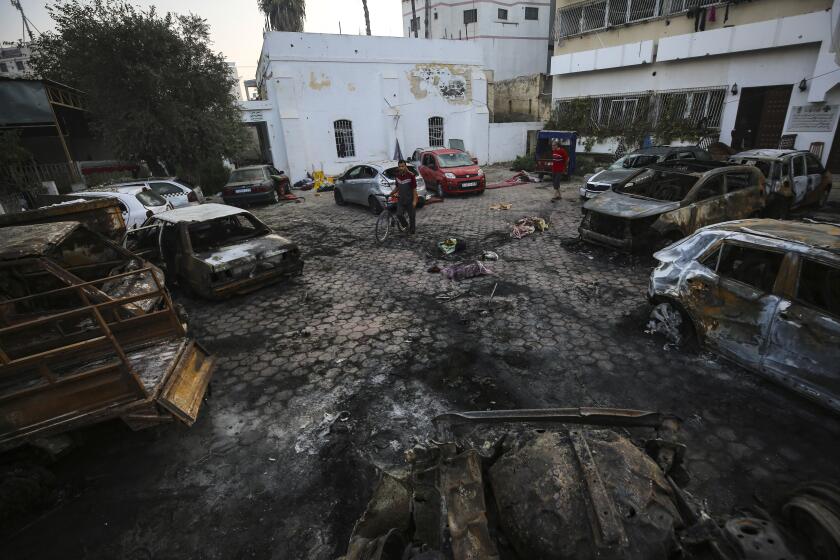Column: She got fired for condemning Palestinians. He got fired for blaming Israel. Is that right?

Should Americans be punished or lose their livelihoods for things they say about a gut-wrenching conflict taking place halfway across the world? In an ideal world where freedom of speech is absolute, short of advocating violence, no one should get fired for stating an unpopular view.
But we don’t live in that world, as some professionals with strong points of view and the irresistible urge to share them on social media are finding out.
One day after the heinous Oct. 7 Hamas attacks on Israeli civilians, the Philadelphia 76ers basketball team tweeted out a message of support for Israel: “We stand with the people of Israel and join them in mourning the hundreds of innocent lives lost to terrorism at the hands of Hamas.”
Jackson Frank, a young sports reporter who had been hired in September to cover the 76ers for PhillyVoice, took exception.
“This post sucks!” Frank quote-tweeted. “Solidarity with Palestine always.”
He was fired the next day.
In Los Angeles, Tara Strong, 50, a successful voice-over artist who has played Bubbles in “The Powerpuff Girls,” Timmy in “The Fairly OddParents” and Melody in “The Little Mermaid II,” among many other roles, was fired from the animated series “Boxtown” because, the producers said, she promoted “controversial messages regarding the peoples of Palestine currently being affected by the ongoing Israel-Palestine crisis.”
The U.S. must stand firmly behind Israel but caution our ally against overreacting against Gaza’s civilians to the grotesque Oct. 7 Hamas attack.
Strong says she was “fired for being Jewish.”
Creative Artists Agency superagent Maha Dakhil, 48, who represents Tom Cruise, Madonna, Natalie Portman, Anne Hathaway and Reese Witherspoon, stepped down from her leadership roles after she was deluged with criticism for reposting an Instagram story from the account Free Palestine. “You’re currently learning who supports genocide,” said the post, to which Dakhil added, “That’s the line for me.”
On Wednesday, writer-producer Aaron Sorkin, who had worked with Dakhil for six years, announced that he was ending his relationship with CAA in favor of its competitor, William Morris Endeavor.
“Maha isn’t an antisemite,” Sorkin said in a statement I found perfectly reasonable. “She’s just wrong.”
Celebrities certainly are entitled to wade into the current crisis on Instagram and X. Whether it’s in any way productive is another matter.
It goes without saying that these three careers would be entirely intact if not for social media’s tendency to encourage heat over light. Frank, in an interview with Philadelphia’s Jewish newspaper the Exponent, stood by his tweet. “I’m proud that I stood by my values,” he said, which is hardly reassuring about his ability to keep his personal feelings personal, generally a requirement in our profession.
Strong said she hastily “liked” a tweet, then “unliked” it when she read it all the way through and realized it was Islamophobic. In perhaps the understatement of the year, she wrote, “The internet is SO quick to peg people & make judgments.”
Dakhil, by contrast, took down her post, and said, “I’m sorry for the pain I have caused.”
What constitutes acceptable speech in a fraught moment like this is entirely subjective. But if you anger your bosses, if you embarrass them or bring disrepute to the organization for which you work, you may get fired — or maybe not.
Take for example what recently transpired at the New York Times.
The torrent of fake videos, phony experts and enraged screeds unleashed by the Israel-Hamas war shows the failings of social media as a news source and underscores the need for something better.
The newspaper was the most prominent of several news outlets that fueled widespread protests in the Arab world after reporting — apparently wrongly — that an Israeli rocket had fallen on a Gaza hospital. Just days later, the Times defended its decision to rehire a Palestinian freelancer in Gaza. Photojournalist Soliman Hijjy had been let go last year after his antisemitic 2012 Facebook post was highlighted by a pro-Israel media watchdog group. The post featured a doctored photo of Hitler taking a selfie, under which Hijjy wrote in Arabic, “How great you are, Hitler.”
Gilad Erdan, Israel’s ambassador to the U.N., tweeted, “The @nytimes has just rehired a NAZI. Let that sink in.”
Impossible, I thought. This is a news organization, after all, that forced out a top editor after the Opinion section he oversaw published an essay by MAGA Sen. Tom Cotton (R-Ark.) calling for a military response to unrest in American cities during 2020 Black Lives Matter protests. How on Earth would it allow itself to be associated with a Hitler fan?
The Times must have decided — inexplicably, given its professed social media standards — that a well-sourced journalist on the ground in the Gaza war was worth the flak it would inevitably receive.
My sisters are taking refuge north of Gaza City in a hospital and a school operated by the United Nations, but no place in Gaza is safe.
In a statement to the New York Post, an unnamed representative for the New York Times said the company had taken “a variety of actions” to ensure that Hijjy would not violate the Times’ standards in the future. “Mr. Hijjy followed those steps and has maintained high journalistic standards,” the Times said. “He has delivered important and impartial work at great personal risk in Gaza during this conflict.”
Meanwhile, MAGA Republicans, always ready to take a match to the U.S. Constitution, are calling for crackdowns on the free speech of pro-Palestinian college students. Florida Gov. Ron DeSantis ordered state universities to ban Students for Justice in Palestine, a decades-old group with chapters on college campuses across the country, alleging that it supports terrorism. The chancellor of Florida’s state university system has threatened school officials who do not shut the chapters down with “necessary adverse employment actions and suspensions.”
Listen, I’m sure we all feel like a pingpong match is being played inside our heads and hearts over what’s happening in Israel and Gaza.
The carnage and terror visited on Israeli civilians and the taking of hostages by Hamas is a monstrous crime that no amount of historical context justifies. The estimated 220 people still held as hostages by Hamas must be released.
And while the retaliation against Hamas in the Gaza Strip by the Israel Defense Forces may be understandable on a gut level, its execution is morally indefensible. Not because Israel does not have the right to destroy Hamas — it does — but because the killing and suffering of thousands of Palestinian civilians, about half of whom are children, is also an affront to humanity.
Reasonable, compassionate human beings can hold both of these thoughts. If you feel the need to say otherwise, just know that — fairly or unfairly — you could end up paying a price.
More to Read
A cure for the common opinion
Get thought-provoking perspectives with our weekly newsletter.
You may occasionally receive promotional content from the Los Angeles Times.
















